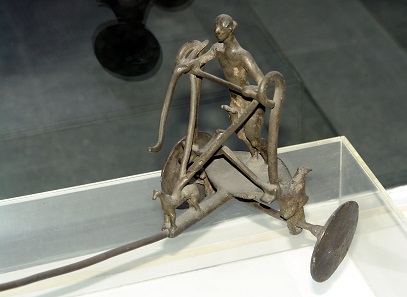by Björn Schöpe
translated by Annika Backe
August 4, 2016 – In the previous weeks, Chandpur in India witnessed some kind of ‘gold rush’, as the media called it. It is questionable, however, if there was any gold found at all in the city located some 120 kilometers north-east of New Delhi. Only one thing is certain: While working in his field, a farmer found archaeological artefacts made of copper. Rumor spread like wildfire that the findings also contained gold coins. And gold coins can be melted down and sold at a good price to the local goldsmith. And so, full of hope, the villagers started digging themselves…
It is said that several fields have been ploughed up by the adventurers day and night. They did not find any gold, but ‘just’ some more ancient utensils with no great market value. The activities, on the other hand, reached such an extent that it attracted the attention of the local district administration which then informed the Archaeological Service of India.
This bullock cart with driver from the Harappan Civilization is an example of the impressive metal objects that were created in the Indus Valley around 2000 BC. Photo: Yann / https://creativecommons.org/licenses/by-sa/3.0/deed.en
A team of archaeologists investigated the findings on site. The ‘Times of India’ quotes Superintending Archaeologist Bhuvan Vikram: “The utensils are believed to be belonging to Harappan civilisation and are about 4,500 years old. We will start a research operation to determine the exact date and period of these utensils.”
The Indus Valley Civilization, also known as the Harappan Civilization after Harappa as its main find site, is considered to be one of the world’s earliest urban civilizations. From 2800 to 1800 BC, it flourished in the basins of the Indus River where complex city structures including paved streets were built.
The archaeologists believe that more, and valuable, finds may be lying in the grounds of Chandpur. To the people in the vicinity, however, the dream of easy money is not likely to come true.
To date, only the Times of India briefly reported on the discovery.
Two years ago, something quite similar happened in Thailand, in the Phatthalung Province. Of course, CoinsWeekly reported on it.
As we were able to inform you in our newsletter of June 26, 2014 the officials gained control of the situation by rumoring among the local villagers that the gold was cursed and only the finder who handed the objects over to the government could escape the demons’ wreath…
By the way, for watching a five-part documentation on the Indus Valley Civilization, please click here.





